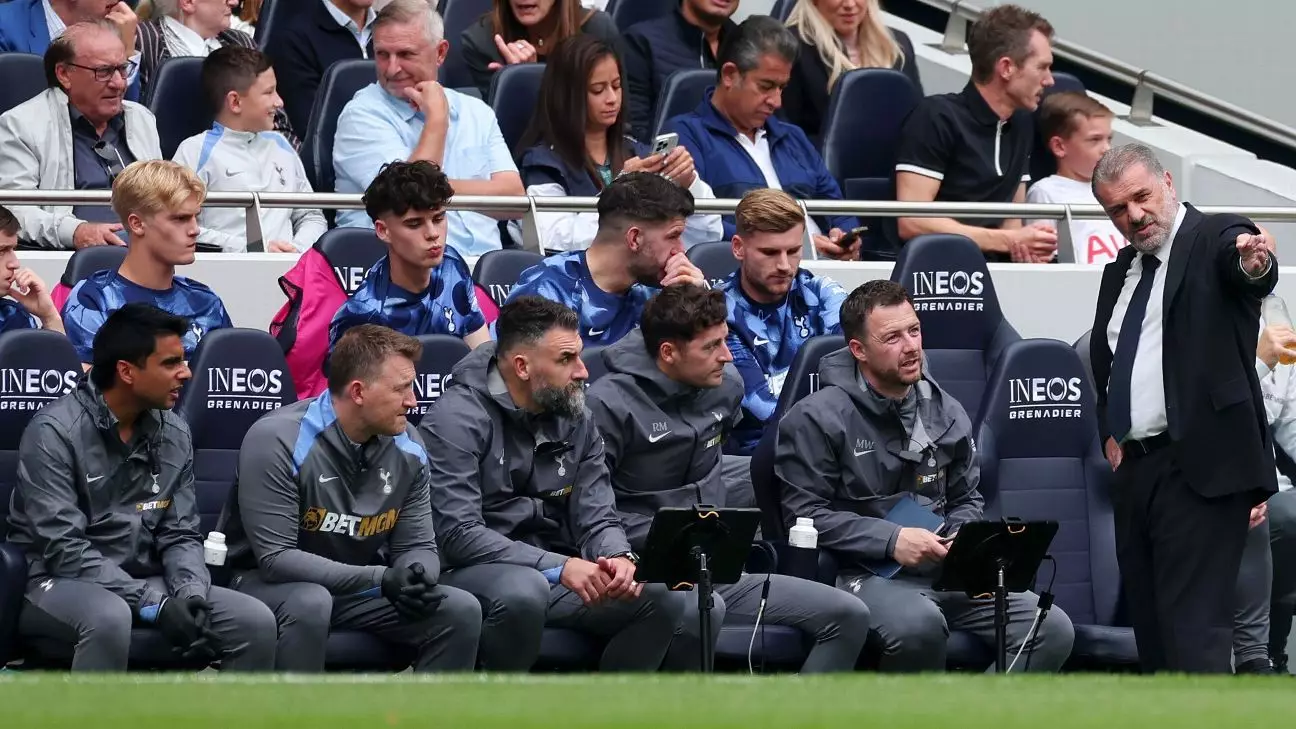On a crisp Thursday morning at Hotspur Way, Tottenham Hotspur’s extensive training facility in Enfield, London, the atmosphere is charged with anticipation and urgency. Just hours prior, the team had suffered a narrow defeat against Galatasaray in the UEFA Europa League, a match influenced heavily by the remarkable performance of Victor Osimhen. Despite the disheartening loss, the coaching staff, led by manager Ange Postecoglou, immediately shifted focus to the upcoming Premier League fixture against Ipswich Town scheduled for Sunday.
For the coaching team, including assistants Mile Jedinak and Nick Montgomery, this meant sacrificing precious sleep to dive into preparations that included strategic meetings, detailed training sessions, and intense player analyses. This rigorous environment, coupled with the expectations of performance, creates a fascinating dynamic where every minute counts. The sheer volume of planning and preparation underscores the relentless nature of professional football where teams cannot afford to linger on previous defeats—each minute spent in reflection could potentially cost valuable points in the league.
Mile Jedinak, a former captain of the Socceroos under Postecoglou, eloquently describes the Spurs’ coaching environment as one characterized by collaboration and mutual challenge. He emphasizes that each member of the coaching staff holds a unique role within the larger framework, allowing for a multitude of approaches to player development and strategy. This individuality among the coaching staff not only enriches the training sessions but also establishes a culture where players are consistently encouraged to absorb information and improve—both individually and collectively.
Such collaborative spirit is essential in a high-stakes environment like Tottenham, where players must be pushed to maximize their potential, and staff members are expected to bring their best to the table at all times. “When you’re on this side of coaching,” Jedinak reflects, “you truly grasp the extensive effort that goes into every detail that often goes unseen.” The shared responsibility among the coaching team allows for a broader range of ideas and methods to be explored, ultimately leading to a more comprehensive training regime for the players.
The Art of Trust in Management
Ange Postecoglou’s management style has garnered acclaim for establishing a delicate balance between maintaining a distance from his players while ensuring that his assistants are deeply involved. This philosophy fosters an environment built on trust, where players can feel secure yet motivated to perform. According to Montgomery, this trust empowers assistants to take ownership of their responsibilities, leading to productive interactions with players. The freedom to engage with players, combined with Postecoglou’s watchful eye, creates a milieu where staff can guide players effectively, emphasizing the necessity of clear communication and strategic planning.
As Montgomery notes, “Giving staff that level of trust is empowering.” This empowerment translates into actionable strategies during training sessions, allowing for a dynamic that sustains the players’ engagement while also holding them accountable.
Both Jedinak and Montgomery share a common vision: they are not just focused on the present but are also keenly aware of their aspirations as future managers. Each recognizes the importance of nurturing young talent beneath the shadow of seasoned players, a trait that Postecoglou has not shied away from. The coaching staff’s willingness to include younger players in critical matches indicates a forward-thinking philosophy that is essential for long-term success in professional football.
Montgomery recalls his time coaching in the A-League, emphasizing that the principles he utilized to develop talent there remain relevant in a more resource-rich environment like the Premier League. “I love that we go out to win every game and are unafraid to outscore the opposition,” Montgomery states. This aggressive approach woven into the coaching fabric at Spurs is not just about immediate results, but about forming a cohesive unit oriented towards sustained success.
As the coaching staff prepares for the challenges that lie ahead in the Premier League, the underlying theme that resonates through their conversations is one of continuous improvement. Being part of a high-caliber team leads to collective growth—not just in terms of strategy and skills, but also in fostering relationships built on trust and mutual respect. This setup is particularly critical in the fast-paced environment of the Premier League, where performance levels can fluctuate dramatically.
Postecoglou’s initiative to promote coaches from Australia illustrates a commitment to diverse coaching methods and philosophies. His focus on opening doors for future coaches signifies an ongoing chain of mentorship that could redefine the coaching landscape in football. As Jedinak succinctly puts it, in such a competitive environment, dedication to improvement is not only a personal choice but a necessity for survival and success. In turn, this creates a dynamic and exciting atmosphere at Tottenham Hotspur, one that fosters both player and coaching development as they navigate the exhilarating challenges of top-tier football.

